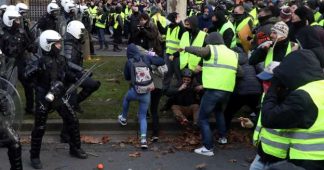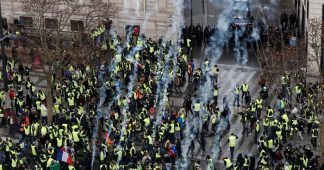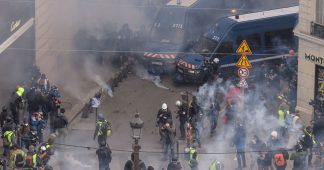By Will Morrow
15 December 2018
In the lead-up to the fifth successive Saturday of mass “yellow vest” demonstrations across France today, the government of President Emmanuel Macron is signaling a new wave of violent police crackdowns on protesters.
In Paris, police prefect Michael Delpuech told the radio station RTL that the response today would be “about the same” as last Saturday. More than 1,700 people were rounded up in mass arrests across the country, 1,083 of them in Paris alone, while police kettled and baton-charged protesters and assaulted them with stun grenades, bean-bag bullets, water cannon and tear gas. Images of elderly protesters with their heads split by police assaults have been shared widely on social media.
Delpuech said 8,000 riot police will be deployed in the capital, along with 14 armored cars, which before last Saturday had never been used by police in Paris. Approximately 90,000 government forces are being deployed around the country. In Toulouse, between 400 and 600 police are being readied, with two water cannon trucks, a helicopter, and armed tanks placed on standby.
In Troyes, a city of 60,000 located 90 miles south-east of Paris, the police prefect released a statement yesterday outlawing all protests in the city center, and threatening anyone who violates the edict with 6 months’ jail and a 7,500 euro fine.
Reports indicate that a similar number of people are expected in the demonstrations as last week, when over 160,000 people protested across the country. Demonstrators overwhelmingly rejected Macron’s attempts to end the protests by scrapping his earlier proposed fuel tax increase, and a speech by the former investment banker on Monday, delivered from the gilded Salon Doré of the Elysée Palace, professing concern over social inequality and offering negligible concessions.
While sparked by Macron’s regressive fuel tax increase, which would mean 200 euros per month for workers travelling long distances to work by car, the “Yellow Vest” protests are being driven by far broader issues of deep social anger, in France and internationally, over decades of austerity against the working class, tax cuts for the rich, the impoverishment of the population and concentration of wealth in the hands of a tiny financial elite. They are part of a growing international upsurge in struggles by workers a decade after the 2008 financial crash.
Calls are spreading on social media for a “yellow vest” protest in Portugal to set up blockades and bring traffic and the country’s economy to a standstill. On Thursday, more than 3,000 people protested in Hungary’s capital of Budapest in opposition to right-wing President Victor Orban’s new labor law allowing corporations to require workers to work up to 400 hours overtime per year.
In Israel, hundreds marched in a “yellow vest” protest in Tel Aviv against the high cost of living, while “Red Vest” protests are being organized in Tunisia. The Egyptian military dictatorship has banned the sale of all yellow vests and has detained an Alexandria lawyer, Mohamed Ramadan, for 15 days in response to a picture posted on social media showing him wearing a yellow vest.
Speaking in Brussels at a scheduled European Union summit on Friday, President Macron addressed the protests in France, declaring that “I do not believe our democracy can function through a dialogue that expresses itself in occupations of public places, and actions of violence.” France “needs calm, needs order, and needs to return to its normal functioning,” he said.
In combination with a police crackdown, the government is relying on its allies in the trade union bureaucracy to bring the “yellow vest” protests under their control and strangle them.
The main trade union federations called a “day of action” of strikes and protests yesterday, claiming to be in support of the “yellow vest” movement. Philippe Martinez, the head of the Stalinist French Communist Party-affiliated General Confederation of Labor (CGT), the largest trade union federation in France, told BFM-TV that the CGT was calling for a “convergence” of the “yellow vest” movement with the unions, and fighting for a “strike everywhere.”
The “day of action,” endorsed by not only the CGT but all five of France’s main union federations, was a fraud, and workers overwhelmingly ignored it. The unions did not organize any serious strike action. The railway network functioned at close to normal capacity.
Workers are aware that the unions, which responded to the “yellow vest” protests by denouncing them and slandering them as right-wing, are seeking to defend Macron. The unions do not want to expand the struggle by mobilizing the working class in struggle against Macron; rather, they are trying to channel broad opposition to Macron in the working class behind impotent, one-day actions under their control, to let off steam and isolate the “yellow vest” protesters.
Their attitude was made explicit by Lauren Berger, the general secretary of the Socialist Party-linked French Democratic Labor Confederation (CFDT) union, in a statement on Thursday. Berger called for an end to all “yellow vest” protests, denounced them as violent, and said “if a trade union was responsible for as much violence in a movement as it [the yellow vest protest] has unleashed, it would have been banned for 20 years.”
The failure of the unions’ strike call comes despite growing numbers of protests and strikes by French workers and students in the past week. High schools are still being shut down across the country by students, who have demonstrated outside their buildings against the government’s pro-business education reforms. In Toulouse, demonstrations at multiple high schools were broken up by police on Thursday.
Strikes have taken place in a number of industries, including an indefinite strike by school canteen workers in Marseille, who have closed down 204 out of the 444 school canteens in the district, in opposition to the raising of work hours by the local government.
The Macron government has sought to exploit the murky and still-unexplained mass shooting at the Strasbourg Christmas Market on Tuesday night, which killed four people and wounded another 13, to demand an end to the protests. The alleged shooter, Cherif Chekhatt, a 29-year-old man who had been on an official government watch-list for years, was killed in a shootout with police on Wednesday evening in Strasbourg.
Police claim that they spotted Chekhatt walking down the street, in the same city where he had remained for two days while somehow evading a manhunt involving over 700 police officers. Police have also admitted that they visited Chekhatt’s apartment just hours before the attack took place, on an apparently unrelated issue.
Interior Minister Phillippe Castaner visited Strasbourg on Friday and demanded that protests be brought to an end. “I cannot tolerate the idea that today we applaud our police and that tomorrow some people still think it’s helpful to throw stones at them,” he said. Castaner threatened that the police orders would be “evolved” throughout the day in response to “rioters.”
While among workers and young people there are widespread suspicions over the fortuitous timing of the Strasbourg attack for the French state, the media has denounced any questioning of the government’s account as “conspiracy theories.”
An article published in the New York Times yesterday linked these arguments to the ruling class’ demands for internet censorship, which are being driven by fears over workers’ use of social media to organize struggles and communicate independently of the corporate- and state-controlled media.
“But there is also plenty of misinformation” promoted through social media, “which provides fuel for disaffection,” the Times notes. “After the Strasbourg shootings, in which a gunman killed three and wounded 11 others at a Christmas market, some users in Facebook groups falsely accused Mr. Macron’s government of using the attack as a diversion…”
The Times piece concludes with a brief for internet censorship as the only means to prevent the growing movement of workers and young people: “But the proliferation of rumors and misleading posts on Facebook about the protests has led to concerns that the site is inflaming anger and making it harder for authorities to find solutions.”











